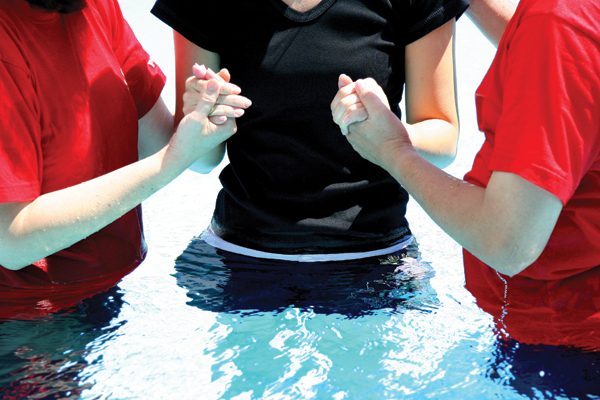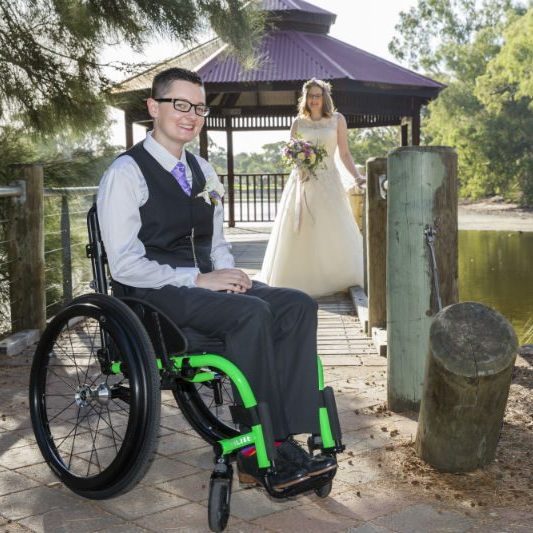 Do you feel your spiritual side gets short shrift because you’re gay? Here’s how to start finding the balance.
Do you feel your spiritual side gets short shrift because you’re gay? Here’s how to start finding the balance.
I remember the first time someone told me I was going to hell—it was my reflection glaring at me from the bathroom mirror, reeling from my first lesbian kiss. The stinging words scrolled through my 19-year-old mind on a continual loop. “I’m going to hell. God can’t love me if I’m gay. I’m going to hell.” Devastation crept in and I began hating myself for the first time. At that moment, as I brought water to my flushed face, I could think of only one thing to do. I decided to be indefinitely single. I decided this in the way that one decides to go out into a cold winter’s night—a sheer act of will. This became my life for the next six years.
Raised in a conservative church, I faced what so many other LGBT Christians struggle with, too: finding a way to reconcile my spiritual beliefs and the true desires of my heart. According to my to the church’s backward beliefs about homosexuality, I was a lesbian anomaly. I had two incredible heterosexual parents. I was never sexually abused. I didn’t have an absent father or an overbearing mother. Perhaps I had some subconscious aversion to the male race. But what caused it? More than once, I blamed it on the experience of my first kiss. I was 12. His tongue felt like slime, and he smelled like a combination of hot dogs and mouth rinse. By my mid-20s, I could no longer ignore my same-sex attraction. So from deep within the closet, I began my venture out. It’s an ongoing journey, but I have slowly realized that I don’t have to give up my faith or my sexuality. Here are some guidelines to help you on your own journey.
1. Find a support system.
One of the most helpful things you can do is realize that you are not alone. Find like-minded individuals who will share their stories and offer a listening ear. If you are surrounded by negativity, it will be difficult to overcome feelings of doubt and insecurity. Remember that every leader in history had a close circle of friends or companions.
2. Remember the one who screams the loudest isn’t always right.
It’s no secret that thousands of religious extremists misuse the Bible every day. Throughout the centuries, the Bible has been wrongly used to discriminate against women, children, Jews, African-Americans, religious reformers and the mentally ill. It has been used to defend heinous crimes such as slavery, the Crusades and the Inquisition. Historically, the Church’s views on minorities tend to change with the passing of time. There will eventually be a time when discrimination against LGBT people isn’t even thought of in religious institutions.
3. Consider breaking the silence.
If you believe in God and you’re gay, consider speaking out. It can be intimidating, but the religious society needs to understand that there are more of us than they realize. Silence gives birth to misinformation, which gives birth to prejudice. (However, coming out is an extremely personal process. Never do it unless you are ready and can do so safely.)
4. Get back to basics. Research your spiritual background for yourself.
You will find that a lot of prejudice comes from tradition and blind faith. You may discover that you’ve been indoctrinated with false information. According to the same Bible that some use against you, Jesus never spoke one word against LGBT people. In fact, he had an affinity for the outcasts of society. He taught unconditional love, not judgment and condemnation.
5. Love yourself.
This can be more difficult than it seems. Statistically, we remember more negative things people say about us than positive. And let’s face it—there are a lot of negative things being said about gay folks. Surround yourself with positivity. Do something that will enrich your spirit. Take a spontaneous drive with a friend. Volunteer your time or skills. Pray or meditate. Break ties with anyone who makes you question your worth. Remember that you are beautiful and wonderfully made.
There are abundant online resources available for those struggling to harmonize their faith and sexuality. You can start at my website, ComingOutChristian.org, where you will find links to countless websites, organizations, and more. Become part of a movement. Help bridge the gap between our places of worship and the LGBT community. Don’t settle for mere tolerance; be a catalyst for love and acceptance. You really can have the best of both worlds.



